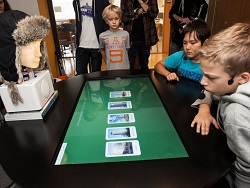Conversational Robots for Language Learning

Modern digital technologies are transforming rapidly the environment in which children are growing up and developing skills. This new digital reality has both changed the nature of the linguistic input provided to young children, but also affords new ways of interaction with communication agents, such as tablets and robots.
At the same time, recent advancements in Large Language Models (LLMs) have transformed our approach to complex challenges such as language learning, opening up for new opportunities that were not available a few years ago. Alongside LLMs, advancements in speech technology — specifically in the fields of speech recognition and synthesis — enable the creation of much more natural, lifelike conversational experiences with AI.
In this project, we use these technologies for conversational AI to implement and evaluate conversational learning tools, with a focus on their application to human-robot interaction. We evaluate both the users’ experience as well as learning outcomes in actual learning environments, addressing various research questions, such as:
-
Should the AI agent be embodied, such as in the form of a social robot, or remain virtual?
-
Should learners engage with the robot individually or in groups?
-
Should the robot switch between the learners' first (L1) and second (L2) languages?
-
What is the value of this technology when used repeatedly over longer time periods?
Publications
Researchers
Funding
- Early Language Development in the Digital Age (e-LADDA) (EU MSCA ITN, 2020-2023)
- Empowering Cultural Integration and Language Learning through Conversational AI (Digital Futures, 2024-2026)
